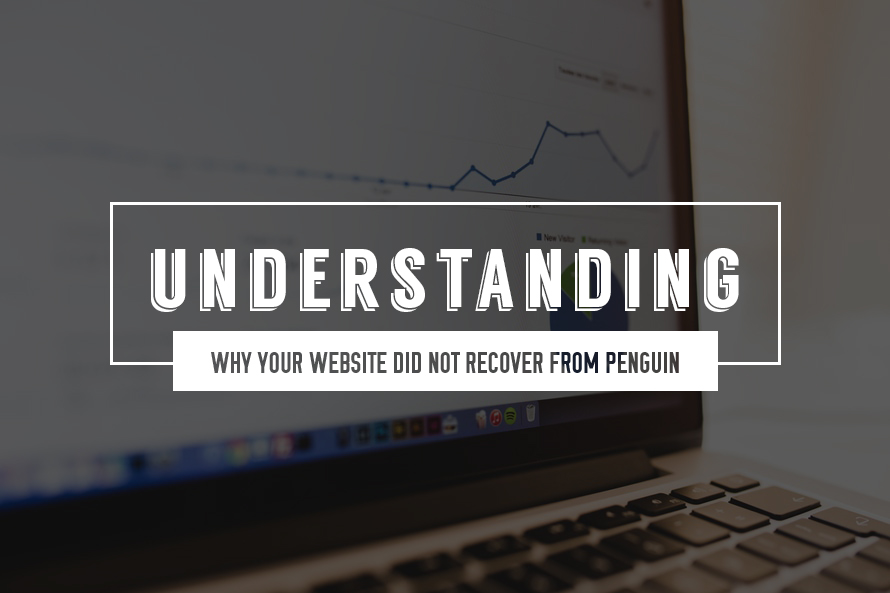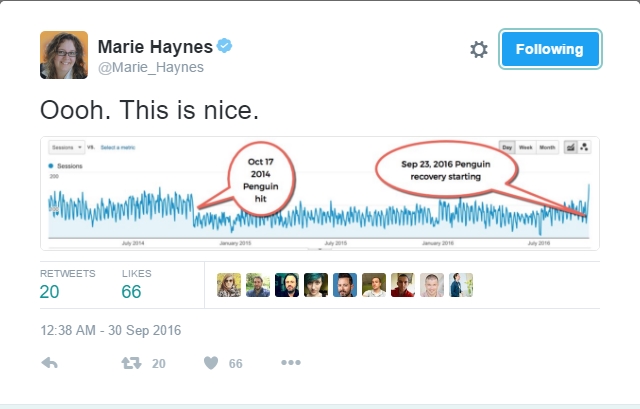Your Website Did Not Recover from Penguin? Here’s 5 Reasons Why
It’s been a while since the last update but from September to October, the Penguin 4.0 update was rolled out and implemented everywhere. The roll-out affected a lot of people and many of them have been reporting recoveries from demotions from the older Penguin updates but I’d like to focus on the people who haven’t recovered. So what if you, along with a select group of people, did not recover from Penguin?
We’ll try to narrow down the reasons as to why your website is not recovering from Penguin and we’ll be starting with the more ludicrous theories until we work our way up to the facts.
Penguin is a hoax
Already I’m starting to laugh because this scenario is highly unlikely. It’s almost impossible to disprove the existence of Penguin because it has been announced and talked about by Google in various forms. Some people might find themselves asking questions such as “what if Google didn’t really change anything?” or “what is Penguin is a hoax?” but Google isn’t really known to lie about their updates precisely because it affects a lot of people and their money.
Another reason why I’m confident that Penguin is definitely not a hoax because various Google representatives and other notable speakers have confirmed that Google had indeed rolled out the Penguin update.
Another tidbit worth considering is that personalities such as Marie Haynes have posted tweets (or blog posts) announcing a noticeable recovery in their stats.
Penguin has yet to come out completely
This scenario is slightly unlikely but it’s not totally impossible. The new Penguin update is unique because not only does it improve upon the previous versions, it replaces them totally and it was designed to work differently compared to the older versions.
Understandably, precisely because the new Penguin works differently it had to be released in phases. What that means is that the code for the new Penguin went live during the expected time period from Google’s announced date 23 September, 2016. The new code is significantly more “lenient” than the older Penguin updates because it devalues what we call “bad link”.
The new code will again, understandably take some time to fully take in-effect because for everything to work out, all of the graphs have to be refreshed and that will indeed take some time, more so for “deeper link”. This makes it realistic to believe that any changes will indeed take some time to full take effect. The good thing about this new update, however, is that while it will take some time for it to be fully effective, its effects will always be felt but not everyone may feel it.
Another good point about the new update is that Google has repealed demotions which happened because of the older Penguin updates. This took effect the moment Penguin 4.0 came into effect. This change didn’t happen overnight because it most probably happened during a couple of days or weeks.
You need to cull the bad links – all of them
Many SEO specialists tried to cull or disavow a certain number of bad links but the problem is that most of those links were probably not the cause of the demotion. Many people then assumed that most of the sites that didn’t recover from Google’s demotions simply didn’t cull enough of the bad links – and they’re probably right.
The thing about Penguin is that it needed people to completely eradicate or disavow ALL of the bad links but the new Penguin is different. The new Penguin will now simply devalue bad links and the effects, according to Google should be minimal (they used the term “Granular”) and that means that your website and all of your links should not be suffering from a demotion because of said bad links.
The question now is that is it still wise to keep culling the bad links? Of course. Will removing all of them solve your problems? No, because again, the new Penguin works differently.
Your links were devalued into oblivion
Now this seems extremely likely because as we said in our point above, Penguin will now simply devalue bad links. However what if most of your links are considered “bad”? Then that means that your website will then get devalued into almost nothing. It is therefore logical to assume that your demotions were repealed but then your links were simply devalued into oblivion which means that your rankings will not experience a recovery. Equity in your website to link ratio will now leave your SEO with little to no benefits at all!
What this means is that culling the bad links will no longer serve you in a positive manner. The best way to go about this is by starting anew by creating and building quality links that should be considered “bad” by Penguin. While this may be an easy fix, it is actually deceptively hard because it will take some time and effort for you to create quality links that will help your website’s value rise. Don’t be tempted by the easy way out, however (i.e. Black Hat SEO) because while the changes will immediately be felt, such short cuts are not a permanent fix. It is still much better to work the “hard” way by building quality links because the returns will feel that much more meaningful.
Penguin wasn’t your problem in the first place!
This is a troubling reality to accept but this is the most possible outcome or scenario out of the other possibilities in this list. While this may seem unlikely, it is actually more common than most people would care to accept. There are still demotions from way before Penguin and there are other algorithms or codes that penalize bad links. Links are so powerful that this shouldn’t be surprising. Penguin 4.0 does not mean that the other algorithms no longer work.
Another possibility that remains is the continued presence of manual actions. These manual actions should appear in the Google Search Console in the near future but it should be noted that Google will still take reasonable action against bad links.
At the end of the day, if you still haven’t recovered from Google, remember that there are a dozen of issues that could be affecting your websites; Technical SEO or an algorithmic issue, any of these could be affecting your website negatively. One way of going about this is through trial and error. You may need to consider trying to look for your problem – and one thing is a very scary possibility: that problem isn’t Penguin.

